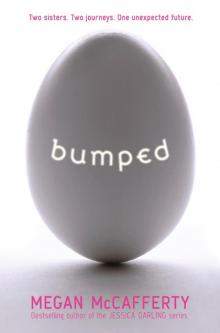- Home
- Megan Mccafferty
Perfect Fifths Page 2
Perfect Fifths Read online
Page 2
Jessica wonders who will be the first to find out about their momentous collision, and when. Such a reunion has been a forgone conclusion among Jessica’s best friends since the breakup. They would not only expect a second-by-second reenactment but are exponentially invested to demand one. And on any other day Jessica would have complied. She would have told them everything, starting with how calmly Marcus reacted to being run over by his ex-girlfriend in the middle of Newark Liberty International Airport, as if he’d been expecting it, not in the same “someday” way that Jessica and her friends had expected it to happen, but almost as if he had chosen to wait in that exact spot on the straightaway under the arrivals and departures boards outside the men’s restroom because he knew she was on her way.
But not today. No. Even before the crash, she’d already had her reasons for not making today about her. And because it is definitely not about Marcus Flutie, either, she forces him out of her mind. She keeps moving. She must keep moving if there’s any hope of her making this flight. (I can’t miss this flight.) Bridget and Percy didn’t question Jessica’s need to make a pit stop in Pineville before traveling to the Virgin Islands, which only makes her feel worse about having bailed on the bridal shower and the bachelorette party. She has little hope of arriving in time for tonight’s rehearsal dinner even if the flight (I won’t miss this flight) hasn’t already taken off without her. But Jessica must be there for tomorrow’s wedding, because she is the ministress of ceremonies, after all.
That didn’t happen.
Oh, yes, it did.
Her thoughts ineluctably return to Marcus and the last time they were in the same room together: He was hunched over, bent at the waist on the edge of his bed, slowly turning two unopened notebooks over and over in his hands. Four sides. Turn, turn, turn, turning. Pages, pages, pages, binding. He had just listened to Jessica explain that those two black-and-white-speckled composition notebooks contained all the reasons why she couldn’t be with him anymore. His callused palms shushed across the pages, pages, pages, binding—the only sound.
He read them and, a week later, returned them. “They belong to you,” he said in a letter written on the second notebook’s final pages. Marcus had vowed to honor Jessica’s request to let her go, and let her be, and he had shocked her by actually making good on that promise. Some might puzzle for years trying to remember the final word exchanged with an ex-lover. But no such ruminations have been necessary for Jessica, because the last word from Marcus was definitively written in ink as the closing to that final communiqué:
WHATEVER
WHATEVER, as he explained in that letter, was the double-meaning irony that wrapped around his bicep in the form of a poorly executed Chinese-character tattoo, one that Marcus had wanted to spell FOREVER but that had gotten lost in translation. Since the return of those notebooks, since WHATEVER, Jessica hasn’t heard another word from him.
She has, however, heard the gossip.
He got into Princeton’s most prestigious secret society.
He failed out.
He won a Rhodes.
He lost his mind.
The most obstreperous rumors were inspired and spread by the usual suspects, Pineville High alumni such as Sara D’Abruzzi-Glazer and Scotty Glazer, whose social orbit barely extended beyond their hometown since the birth of their third kid in as many years. And Manda Powers, who (the last Jessica had heard) was couch-surfing around the world all by herself and had an uncanny knack for bumping backpacks with adventurous nomads who claimed to have met someone who met someone who met someone from her suburban New Jersey hometown, someone whose name is—What was it? Oh, right!—Marcus Flutie.
He’s fucking an eighteen-year-old freshgirl.
He’s fucking a forty-eight-year-old professor.
He’s not fucking anyone.
He’s engaged.
He’s gay.
The more legitimate updates were always provided by well-intentioned friends and family members who mistakenly believed that Jessica wanted to know what Marcus Flutie was up to. Like Paul Parlipiano, who e-mailed to express his surprise to find himself hammering alongside Marcus on a neighborhood rebuilding project in the Lower Ninth Ward. Or Cinthia Wallace, who swore she saw him in the audience during the opening-night performance of the off-off-Broadway musical satire of Bubblegum Bimbos and Assembly-Line Meatballers. Or Jessica’s niece, Marin, who, apropos of nothing other than the fact that she was a child and still begrudged the missed opportunity to be a flower girl, occasionally asked, “Do you think Marcus has proposed to someone else by now?” Or Marin’s mother, Jessica’s own sister, Bethany, who didn’t have the naïveté of youth to account for answering “Oh, I hope not,” followed by “But could you blame him if he has?”
He started drinking again.
He quit speaking again.
He started drugging again.
He quit cold turkey again.
Then there are those who indirectly court conjecture, like Bridget, who sent links to Found.com asking, “Could this be a page from Marcus’s journals that were stolen out of your car?” (To which Jessica always answered no.) Or Percy, responding to the schlub whose NBA half-court halftime marriage proposal was turned down on live TV, asked, “Jessica, you tell me, how’s a man supposed to recover from a rejection like that?” before being shoved into silence by Bridget. Or Len Levy, another one of Jessica’s lovers (a number best described as threeish, or three and two halves, the halves referring to two separate one-time-only nonpenetrative lapses in judgment involving two separate men and therefore not equaling a whole lover), who turned everything he thinks he knows about Jessica and Marcus into a song titled “My Song Will Never Mean as Much (As the One He Once Sang for You).” Despite college radio play and its current status as the eighty-seventh-most-downloaded single on iTunes, this other song turned out to be a self-fulfilling prophecy. Because it is indeed Marcus’s song (You, yes, you linger inside my heart / The same you who stopped us before we could start …) that plays in Jessica’s head right now.
He looks totally different.
He looks happy.
He looks tortured.
He looks exactly the same.
He looks as hot as he ever did.
Oh, no, he looks hotter than ever.
It is with a palpable measure of disquietude that Jessica acknowledges that her dumbfounding full-body bender with Marcus has only served to confirm the last and most superficial of these hypotheticals.
Was he coming or going? Jessica can’t stop herself from wondering. If she had asked that single simple question, Marcus would have provided an answer. And this information—any information—would have piqued her curiosity and required her to ask more questions that she didn’t—doesn’t—have time to ask.
Jessica rushes up to Gate C-88. A lone Clear Sky representative named Sylvia is stationed alongside the velvet rope separating the terminal tunnel from the plane on the tarmac.
“I made it!” Jessica exclaims.
Sylvia pinches a heavy-lip-lined smirk. The jetway door, as Jessica can’t help but notice, is closed.
seven
The baby-faced college senior bounds out of the bathroom less than two minutes after he went in.
“Ready?” asks Natty.
Natty has been Marcus’s improbable best friend since they were randomly assigned as roommates during their first year at Princeton University. Despite their difference in ages (five years), roots (Jersey Shore suburbia versus Alabama antebellum), and modus operandi (get serious versus get seriously laid) they have lived with—or near—each other ever since. Natty knows Marcus in a way that is possible only when one is forced to share roughly 125 square feet of living space. Natty doesn’t like the implications of his friend’s stricken expression, one that puts an unusual strain on the peaceful facade for which Marcus has become known.
“Dude?” When his friend doesn’t answer, Natty sucker-punches him in the sternum just hard enough to get his attention. “It w
asn’t her being called over the PA system, okay? It was someone else. So stop—”
“It was her,” Marcus interrupts, soothing circles into his chest with his fingertips, still not taking his attention off Gate C-88.
Natty laughs too loudly, too eagerly, in the vain attempt to get Marcus to see his own ridiculousness. “Do you seriously believe The Queen?”
The Queen. Marcus paid service to The Queen while in New Orleans for what Natty likes to call a “humanitarian vacation;” it evokes a certain Jolie-Pittesque selflessness that makes girls want to have sex with him. And it isn’t untrue—Marcus persuaded Natty to spend the useless reading period before final exams working to rebuild homes in the still-devastated parts of the city. Even though they put in long days of hammering, sawing, and standing around waiting for someone to tell them what to do, Marcus and Natty still had more than enough free time to devote their evenings and early mornings to living up to the city’s unofficial motto—laissez les bon temps rouler.
After a few years of volunteering in the city made famous for its sordid decadence, Marcus is no longer content to sit elbow-to-elbow with tourists in the French Quarter, the kind who consider it a hoot to order an arm’s-length cocktail called the Hurricane Katrina (citrus vodka, blue curaçao, spiced rum, Plymouth Gin, tequila, and apple vinegar, garnished with lime) dreamed up by the more mercenary—or wickedly funny, depending on your point of view—bartenders in town. And he never matched Natty’s enthusiasm for slipping dollar bills to the tittytassel-twirling pros at the sex palace promising more “N’awlins Bounce to the Ounce” (which, in turn, prompted their carnal rivals across the street to promote “MORE N’awlins Booty Meat by the Pound”). Even the novelty of the jazz clubs had worn off when Marcus noticed that he was nodding along with the lazy behind-the-beat rhythms of the city’s take on the blues, just like everyone else in the crowd. To him, it felt less like collective pleasure than passive conformity.
Marcus wanted to feel something real. He wanted to be taxi-driven away from the city’s most famous streets, through the swampy morass of the outlining parishes, to the temple of a voodoo priestess known only as The Queen. As Marcus had been told by those who know, The Queen was blessed (or cursed) with unrivaled gifts in the necromantic arts, as well as widely considered to be the best of all such practitioners of black magic in a city that boasted more licensed shamans than schoolteachers. He was told that The Queen wasn’t much of a show-woman, having dispensed with the ornamental masks, orgiastic dances, and other tropes of the trade that were attractive to tourists. She didn’t even advertise her talents, relying solely on word-of-mouth recommendation. Her demeanor was brisk and no-nonsense, so much so that she never let customers inside her home, and she always made it very clear that she wanted nothing other than to get them off her porch as soon as possible. A true artist, The Queen refused to take money from just anyone, only from those who were approved by the Loa, or spirits who watch over earth. Her services—divination, mostly, with some faith healing and spell-casting on the side when the spirits moved her—could not be validated by any on-or offline guidebook. But if the Loa vouched for Marcus, The Queen would give him the most profound spiritual reading he would ever receive … just by holding his hands.
It was this last bit that really sucked Marcus in. It was preposterous. He was in on her shtick, and he knew that this out-of-the-way place was as much of a tourist trap as any jazz bar or strip club in the French Quarter, just one that required slightly more effort than a less adventurous visitor would give. In fact, for that reason alone, his feeble quest for authenticity was a cliché far worse than the French Quarter frat boys, because at least the brothers of Sigma Chi weren’t puking in the alleys under the pretense of keepin’ it real. And yet for someone who had spent countless hours seeking enlightenment through silent meditation, even a false promise of instantaneous truth was too much for Marcus to resist.
It should be noted that he had been drinking the night of his visit to The Queen. After years of post-teen-in-rehab teetotaling, he had reacquainted himself with alcohol in his freshman year of college at the age of twenty-three. He didn’t indulge very often, and he never set out to get drunk, but his years of abstinence had affected his body’s ability to metabolize booze, making him a lightweight, a cheap date. The disorienting buzz Marcus felt after one or two beers was similar to that which would be expected from someone a foot shorter, fifty pounds lighter, and female.
So it was in such a delicately soused state that Marcus paid audience to The Queen. Even in retrospect, he couldn’t decide whether a response to the alcohol or a genuine spiritual crisis had brought him to this neighborhood of off-the-map shotgun shacks, some of which appeared to have been semi-condemned since the first bitch—Hurricane Betsy—hit in 1965. But once he found himself in front of The Queen’s one-story home, painted a magisterial purple worthy of her reputation, he was glad he had listened to the NOLA local who had tipped him off earlier that afternoon over the spray of dust exploding from the circular saw. Natty was not impressed, however, and chose to stay inside the idling cab so the driver wouldn’t take off without them.
“We ah gone dah hee-yah,” Natty twanged. His accent always came back whenever he drank too much or spent time below the Mason-Dixon Line. On this evening, both qualifications had been met.
“We are not going to die here,” Marcus assured him as he gingerly made his way up the battered stairs leading to a lopsided doorstep. He was about to ring the bell when he heard the metal-on-metal slide of multiple locks. The inside door swung open, first releasing the sweet pungency of dried sassafras and cigar smoke, then revealing a Creole woman in a faded polka-dot housecoat who didn’t look a day over 150 years old.
“Doggone it,” The Queen grumbled. “’Nother one.”
“I’m sorry to bother you,” Marcus said, barely overcoming his urge to bow at her feet.
“Fa sho,” she replied. “’S’what y’all say.”
She contemplated Marcus through the sliced-up screen door, apparently waiting for word from the Loa as to whether he passed muster. He stood in silence, watching hummingbirdlike moths hurling themselves into the irresistible lamplight, flinching whenever one met its end with a metallic ding!
“Yeah, you right,” agreed The Queen, though it wasn’t clear if she was speaking to Marcus or the all-knowing undead. She pointed to a long slit in the screen and said, “Give it here, dawlin’.”
Dutifully, Marcus pushed through five twenties, as he had been instructed before he came.
She counted the bills, then slipped them into the front pocket of her housecoat. The fabric was so faded that Marcus could still see the face of wild-haired Andrew Jackson on the outermost bill. Then The Queen gestured for Marcus to slip his hands through the same open space in the torn screen. She closed her eyes as she took his hands in hers, hands that felt not unlike Jessica’s grandmother’s hands, or those of any of the other elderly patients he used to take care of when he did community service at Silver Meadows Assisted Living Facility—fragile, like decaying paper or the wings of those suicidal moths. And it struck him as odd at the time that he should think of Gladdie, someone he hadn’t thought of in years. He remembered the last time he had visited Jessica’s grandmother before she died—she had beaten him at hearts, her favorite card game, by shooting the moon—and then, of course, he thought of Gladdie’s wake, when he had boldly followed a grieving Jessica into the bathroom, locked the door behind them, and kissed her—hungrily, sloppily—for the very first time—
The Queen suddenly let go. No more than ten seconds had passed.
“Y’all gone get run ovah,” she said.
“Run over?” asked Marcus, making sure he had heard her correctly. “By a car?”
“Noooooo.” She cackled. “Mo’ trouble den dat.”
“A bus?”
“Her,” she said with emphasis, the power of the pronoun in full effect.
Marcus’s mouth dropped open. The Queen’s front door
slammed shut.
“Git off mah poach,” she shouted from inside. “I’m fixin’ to watch ’Merican Ah-dol.”
Natty taunted Marcus for the rest of the trip. “A hundred dollars wasted! That’s ten Hurricane Katrinas! Or one hay-yell of a lap dance!”
Now, back in the airport, Natty still spits with laughter. “Dude, seriously. You believe The Queen?”
“I didn’t,” Marcus says, angling his head to the side and down so he can look Natty in the eye. “Not until Jessica Darling ran over me while you were in there taking a piss.”
Natty still assumes this must be the setup for a practical joke, though he’s hard-pressed to come up with a reason why Marcus would joke about this, about her, of all subjects. “Oh, come on. You expect me to believe that? Try harder …”
“She was standing right there, where you are right now,” says Marcus, first pointing at the floor under Natty’s flip-flops before lifting his finger to gesture across the concourse. “She’s over there, in black.”
Natty looks to Gate C-88. There is a female who, from behind, at a distance of about a hundred yards, vaguely fits the physical description of the girl he met once over three years ago. “Are you sure it’s her?”
“I talked to her, Natty,” Marcus replies. “We talked.”
Just then the girl in question twitches a glance over her shoulder, and Natty must concede: Yes, it’s definitely her.
“Oh, fuck,” Natty groans.

 Bumped
Bumped Perfect Fifths
Perfect Fifths Sloppy Firsts
Sloppy Firsts Fourth Comings
Fourth Comings Charmed Thirds
Charmed Thirds Second Helpings
Second Helpings True to Your Selfie
True to Your Selfie Jessica Darling's It List
Jessica Darling's It List The Mall
The Mall Thumped
Thumped Sixteen
Sixteen The (Totally Not) Guaranteed Guide to Friends, Foes & Faux Friends
The (Totally Not) Guaranteed Guide to Friends, Foes & Faux Friends The (Totally Not) Guaranteed Guide to Popularity, Prettiness & Perfection
The (Totally Not) Guaranteed Guide to Popularity, Prettiness & Perfection